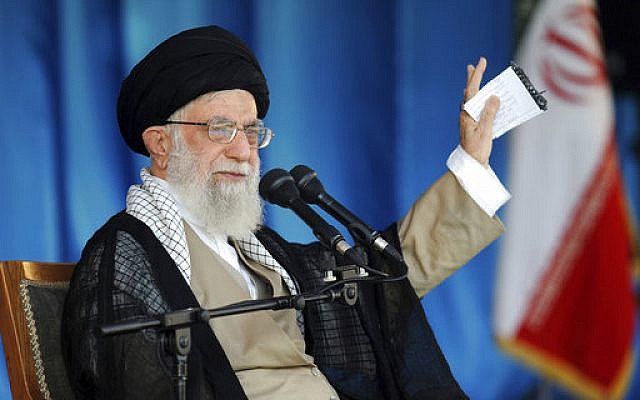Trump, Iran, and the Saudi Arabian Oil Attack
September 27, 2019
There’s no denying that in the last two years, tensions between the United States and Iran have been rapidly increasing as a result of withdrawal from the Iranian nuclear agreement, formally known as the Joint Comprehensive Plan of Action (JCPOA), by the Trump administration in early 2018. The initial agreement, criticized by Republicans for providing a false notion that a path to nuclear weapons would not be attainable by the Iranians, was the focus of much conversation in the 2016 election and beyond. This criticism supplied much pressure to both then President-elect Donald Trump and the Iranians, whose leader, Ayatollah Seyyid Ali Khamenei, even warned that the nation-state would “not renegotiate” the agreement following Trump’s election.
Trump, a candidate that championed withdrawal from all Middle Eastern conflicts and occupations in Iraq, Afghanistan, Libya, Syria, and other neighboring nations, has since changed his tune on the matter after escalations in the region, predominately in Iran. On June 20th, 2019, it was reported that Iran’s Islamic Revolutionary Guard Corps had shot down a United States drone. Despite there being little public evidence that the attack was Iran’s doing, this was followed by heavy great anger from the President, who allegedly had plans to strike Iranian territory, but called off the calls once he had learned how many deaths would be caused.
As time has went on, rhetorical tensions have also continued to rise between U.S. and Iranian forces. The biggest encroachment, however, were the most recent attacks on a Saudi Arabian oil field in early September. It is understood that although this attack was not a direct one on U.S. infrastructure, it is believed to have been done to upend the U.S. oil economy, as Saudi Arabia is our number two provider of oil. The attack halted over a day’s worth of oil production, and the amount of oil destroyed is estimated to be over 6 million barrels.
America’s response to the attack, suitably located on President Trump’s Twitter, exclaimed that the Saudi Arabian government was investigating the situation, and the U.S. stood on the ready, “locked and loaded”, to retaliate against whoever perpetuated the attack. It was later revealed by both the Saudi Arabian and Israeli governments that Iran was responsible for these attacks, and, as a result, the United States announced more ground troops on the Saudi Arabian border. This response has garnered much criticism, even from the President’s political base, as they are vehemently opposed to new Middle Eastern intervention. The President reassured the press, however, that the US would not pursue war in the region, despite the deployment of new boots on the ground.
There are many that believe this attack, in conjunction with the U.S. drone attack in June, are the results of a false flag operation perpetuated by both Saudi Arabia and Israel, as both nations are currently in active proxy conflicts with the state of Iran. In fact, in August, it was revealed that the states of Saudi Arabia and Israel were taking part in covert diplomatic and intelligence operations in the last few years. This fact alone has led many in conspiracy circles to believe that the attacks themselves are being used by this covert alliance in order to force U.S. involvement in Iran, in order to achieve a variety of diplomatic, economic, and geographic goals sought by both the Israelis and the Saudis. However, this remains a theory nonetheless, and is not the officially reported story.
I feel, though, that there may be legitimacy to the claims. The first question to ask: who stands to gain from U.S. involvement in Iran? The answer would be similar to another question: who stands to gain from U.S. involvement in Syria? Or U.S. involvement in Iraq, Afghanistan, or Libya? As conflict in the Middle East has grown due to U.S. involvement, many proxy conflicts have formed in order to utilize the situation to maintain or grow regional hegemony, which has, in turn, created a pawn in U.S. military forces.
My opinion, first and foremost, is that if the United States is going to get involved in any conflict at all, why not utilize unwavering American intelligence that is in no way influenced by international influencers? While many claim this is not possible, as much international interference takes place presently within U.S. intelligence agencies, why sooner rely on intel conjured by the Saudis or Israelis, two states that clearly have much to gain from an Iranian conflict? Additionally, despite the attack affecting the global energy economy, why institute the beginning stages of a hot conflict on the ground in the Middle East when, ultimately, Iranian aggression does nothing to impact the day to day operations of American life, even if the attacks were indeed legitimate? While I have supported the President thus far, I feel as if these choices are a massive oversight of his initial campaign ideology, which included focusing on U.S. problems first, ergo “America First”, when it comes to international conflict. The U.S. military complex, or the U.S. government, for that matter, is not owned by any international entity. It is owned, and operated, by the people within its borders. And the people of the United States overwhelmingly do not support any new conflicts in the Middle East, regardless of the circumstances. Despite this, though, both sides of the political aisle support efforts in curbing the alleged actions perpetuated by Iranians, and the question remains: who are our politicians beholden to? The people that elect them, or an international lobby that seeks to boost their national legitimacy while ours is tarnished? You be the judge.







